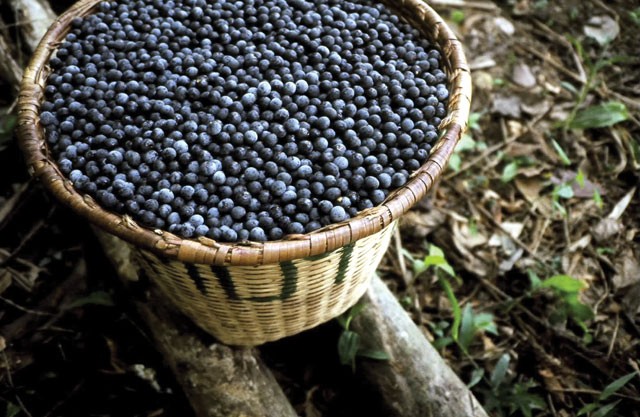
Who can ignore those Facebook ads? Sting, Denise Richards, and champion surfer Kelly Slater all love it. Açaí (“ah-sigh-EE”) has been featured on The Rachel Ray Show. CBS owner and media mogul Sumner Redstone, who’s 85, has publicly credited acai for his vigor and promotes it to his influential friends. Research dermatologist and media darling Dr. Nicholas Perricone has named açaí “the world’s top superfood” for its ability to fight aging.
So what’s behind all the hype? The açaí berry is harvested from July to December in the Amazonian rainforests of Brazil, where it has long been a staple of the everyday diet, used in everything from ice cream to liquor. The açaí berry, though smaller than a grape, is loaded with antioxidants, fiber and minerals. Unlike most berries, it is also high in fat and packs a lot of calories — 10 times more than blueberries. Devotees claim, however, that it boosts energy levels, fights disease, and improves quality of sleep.
Until about five years ago, research on the acai berry was hindered by its short shelf life, but now studies are underway to establish the basics. The antioxidant content of acai products, it turns out, can vary widely depending on the preserving process used. Preliminary research has shown that the antioxidants in acai juice do get absorbed by the body. A study released in July 2008 showed that the juice can reduce the proliferation of leukemia cells outside the body. But other fruits such as grapes, guavas, and mangos have also been shown to limit cancer cells in similar studies, according to work published by researcher Stephen Talcott of Texas A & M University. (Talcott has, however, applied for a patent on a process to produce acai oil.) A study conducted by UCLA researchers earlier this year ranked various juices according to their antioxidant activity and found acai ranked in the middle — below pomegranate and blueberry, but higher than cranberry or orange juices and iced tea.
Abby McChesney, assistant manager at Huckleberry’s Natural Market, says acai products in the form of capsules, juices and powder mixes have sold steadily at Huckleberry’s for years. Consumers started snapping them up after a certain talk show host proclaimed her support. “Oprah has said that she likes them, so we were out of stock for a while,” McChesney says. “Anytime Oprah says she likes anything, we sell out.”
For some devotees, the berry promises a fountain of wellness — and wealth. California brothers Jeremy and Ryan Black brought açaí to the United States in 2000 after discovering the fruit on a surfing trip. They sell retail açaí products through Sambazon, their $20 million company based in San Clemente, California.
MonaVie is perhaps the most popular incarnation of the açaí berry in the United States and is available only through distributors (in the same way that Avon and Tupperware products are made available). The glass-bottled elixir is a blend of 19 fruit juices, including the tart, deep purple juice of the açaí berry.
Jimmy Reese drinks MonaVie twice daily and says he no longer depends on ibuprofen for joint pains. His migraines have stopped. His wife shares his routine and has stopped taking her allergy medications.
After being introduced to MonaVie by a friend, the Reeses, based in northern California, now travel the West, selling the elixir to others, excited by the financial and health opportunities.
The juice blend doesn’t sell for pocket change. One person’s weekly supply costs about $45, but distributors like the Reeses get it wholesale for about $20.
“This is a great way of life. We’re changing people’s lives and helping them feel better,” Reese says.
That sort of frenzy makes Spokane dietitian Craig Hunt skeptical. “It’s such a personal thing when you start believing in a product,” he says. “How much of that is placebo? How much is the product making you feel better?” he says. Hunt says studies done on MonaVie are weak, scientifically speaking, and despite the berry’s impressive antioxidant content, he would encourage patients to eat a variety of fruits and veggies. “People can get a false sense of security about taking products,” he says. “It’s got to be part of an overall wellness picture.”
Additional reporting by Anne McGregor















